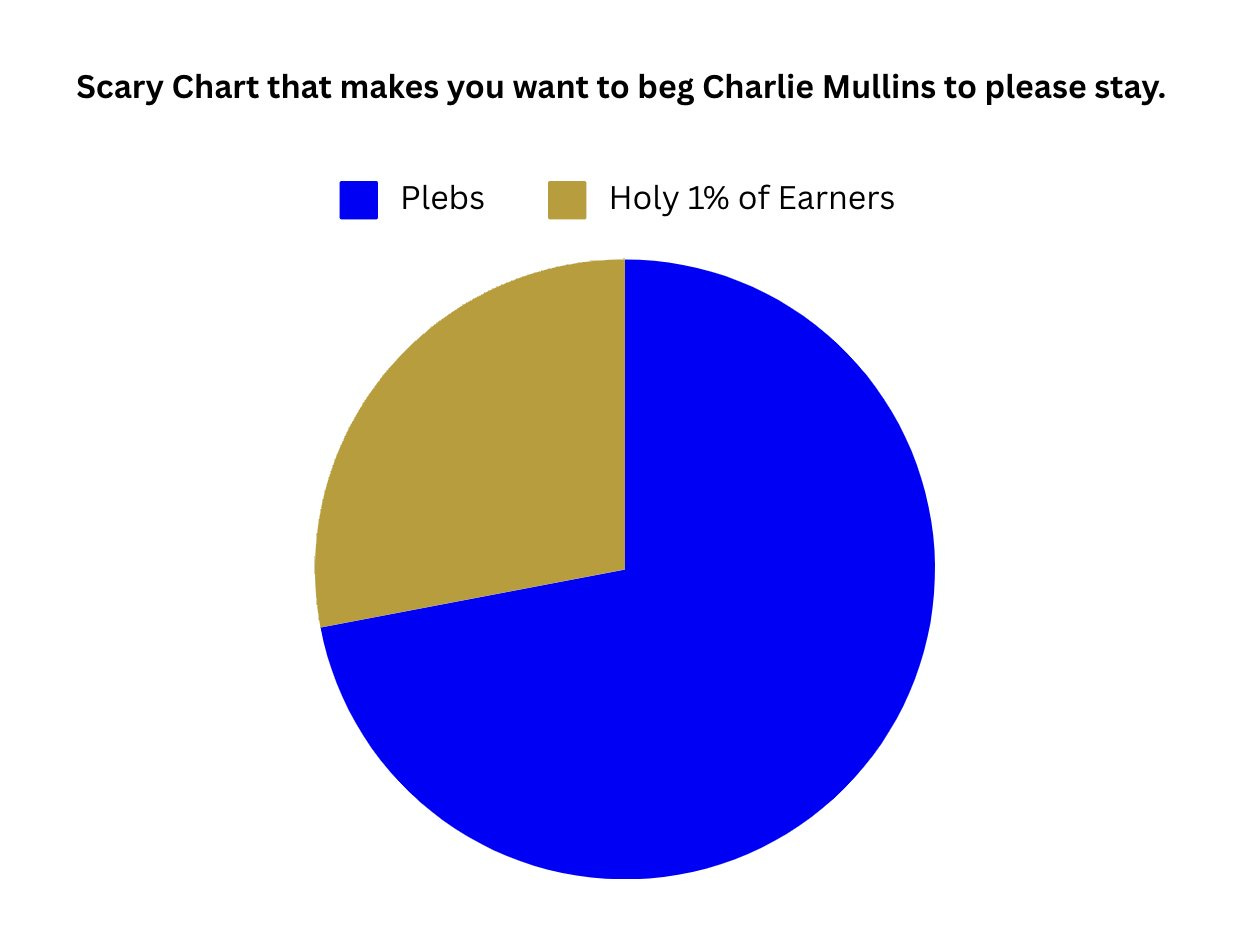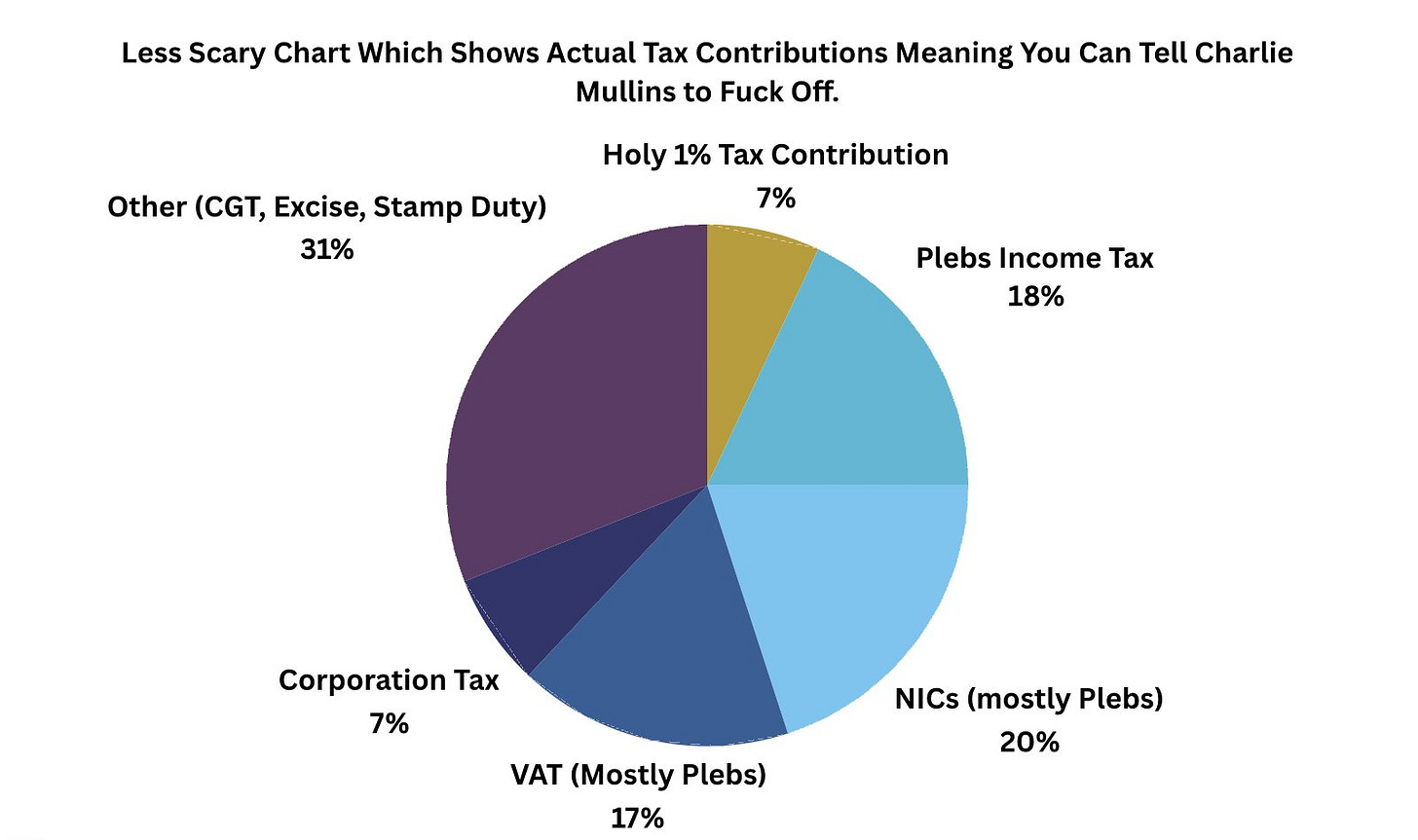Millionaire Meltdown: Why the 1% Aren’t Packing Their Bags Anytime Soon
Why the rich don’t prop up the tax system like you’ve been told—and why they’re not going anywhere.
It’s pitch black at 6 in the morning again; the sun’s packing up for an extended holiday, and apparently, so are the millionaires. But don’t worry, I’ve got my Explaining Crayons ready to brighten your day with a topic that’s bound to send shivers down your spine and leave you effervescent with pure delight:
Taxation.
Yup, that’s right. Nothing says “good morning gorgeous” quite like a breakdown of who’s paying what to HMRC, especially when it’s wrapped in weeks of headlines about the ultra-wealthy threatening to up sticks and flee the UK on the next BA flight to Dubai.
Cue the dramatic music.
We’ve been bombarded by claims like “the top 1% of earners pay 28% taxes,” as if we’re about to be plunged into the abyss if they all grab their golden parachutes and bolt. But let’s not get carried away by the millionaires' melodrama, shall we?
Because the truth, my friends, is far more nuanced (and by that, I mean a lot less terrifying than the likes of the Telegraph would have you believe).
The Actual Tax Breakdown:
Here’s the part the drama queens don’t tell you - while the top 1% may contribute around 28% of income tax, income tax is just a slice of the total tax pie. The rest? Well, it’s spread across a lovely selection of taxes that everyone else chips in on.
Allow me to introduce:
Income Tax¹: ~25% of total tax revenue
National Insurance Contributions (NICs): ~20%
VAT (Value Added Tax): ~17%
Corporation Tax²: ~6-7%
Other Taxes: (Capital Gains³, Inheritance⁴, Stamp Duty⁵, Excise Duties⁶) make up the remaining bits and pieces.
Now, just to be crystal clear: that 28% figure? It applies only to income tax. That’s one-quarter of the total tax take, and even then, the ultra-wealthy don’t contribute anywhere near a third of the entire system. It’s just a shiny stat used to throw us all into a panic.
The Rest of the Tax Burden? Spoiler Alert: It’s Mostly You
While the richest among us are doing their best “we’ll take our money and go, just watch us, if you don't appreciate us we'll LEAVE!” routine, the rest of us, ordinary mortals (some may say plebs), are, in fact, the ones that are keeping the country’s tax revenue humming along.
Take NICs and VAT, for instance. These taxes are regressive, meaning they hit low- and middle-income earners hardest. VAT, that fun little tax you pay every time you buy a sandwich or a new pair of shoes, doesn’t care how rich you are - it takes a bigger chunk of income from those of us who don’t have a yacht parked in the marina. Meanwhile, NICs start to taper off once you hit a certain income level. So, guess who ends up paying a larger percentage of their wages in NICs?
That’s right - the little guy. But no one’s slapping that on the front page with a headline about you holding up the tax system, are they?
The Holy Grail: Loopholes
Now, while the rest of us mere mortals are coughing up income tax, NICs, and VAT on everything from paychecks to Tesco £3.50 meal deals, the wealthiest have access to a buffet of loopholes that make sure their contribution stays conveniently low. Let’s take a quick tour of their favourite tricks:
Offshore Accounts: The classic. Hide your money in a tropical tax haven, and suddenly the UK taxman’s hands are tied. Why pay here when you can bask in the Caribbean (financially, at least)?
Non-Dom Status: This perk allows the ultra-rich (like our ex-PM's wife) to claim they “don’t live here” for tax purposes, even if they’re sipping tea in Chelsea. This way, foreign income stays blissfully untaxed (soon to come to an end).
Dividends, Not Income: Why take a salary when you can pay yourself in dividends? They’re taxed at a lower rate, so your business profits stay in your pocket, not the Treasury’s.
Capital Gains Tax: Investment profits are taxed at a cute little 20%, much lower than income tax rates. Because why should sitting on wealth be taxed more than actual work?
Trust Funds: Set up a nice little trust, and your fortune stays in the family, free from pesky inheritance taxes. It’s like creating a tax-free bubble for your descendants.
Corporate Shenanigans: Big corporations use deductions, offshore subsidiaries, and creative accounting to shuffle profits around. The result? Giant multinationals pay less tax than the local cafe down the street.
And Just Who Are These Top Earners?
Now, a final point on the 1% and 10% categories of earners. To put this all in perspective, let’s take a closer look at who we’re talking about when we refer to the so-called "elite":
The top 10% of earners in the UK are pulling in around £60k to £159k a year. This group includes senior teachers, mid-level managers, engineers, and healthcare professionals like GPs and senior nurses. In other words, solid middle-class jobs that people rely on to pay bills and mortgages - not exactly the "elite" you might be picturing.
The top 1%? Well, this elite club is reserved for those earning at least £160k a year. We’re talking about senior executives, specialist consultants in healthcare, top lawyers, and partners in financial firms. Now, £160k is a nice chunk of change, but we’re not talking about people lighting cigars with £50 notes while lounging on private islands.
And that brings us to the next point: the idea that all of these people are going to pack up and leave the UK is a bit absurd. Let's be honest about this - most people earning between £60k and £160k a year have mortgages, kids in school, and jobs tied to specific industries that aren’t so easy to just up and move. It’s highly unlikely that these earners - many of whom are essential professionals like doctors, engineers, or senior civil servants - are going to leave en masse for some tax haven, and even among the top 1%, not everyone is in a position to leave.
The media might have you believe that the economy would collapse if these high earners left, but the reality is that most of these people aren’t actually going anywhere. Their incomes, while high, aren’t in the billionaire league where international mobility is the norm.
Plus, many of the sectors they work in are location-dependent or tied to public services that they have a vested interest in supporting. So, before we all panic about a mass exodus, let's remember that the idea of millions of "elite" earners suddenly disappearing is more fantasy than fact.
The Long and Short of it?
If the richest 1% want to throw a fannywobble and start talking about leaving, well, let them pack their Louis Vuitton bags. Because the idea that the UK economy would collapse without them is just patently laughable. NICs, VAT, and consumption taxes form the backbone of the system, and those taxes hit everyone - especially low- and middle-income earners. The media loves to whip up a frenzy over “millionaires threatening to leave,” but the truth is, while the rich contribute a lot to income tax, their share of the entire tax burden is far from overwhelming. In fact, when you look at all taxes, the system relies heavily on everyday workers and consumers, not just a handful of high-net-worth individuals.
In conclusion? If the millionaires need a one-way ticket, I hear British Airways has a sale. The rest of us will keep the lights on, thanks (and we will happily do so while Atlas not so much shrugs but throws an attention-seeking hissy fit). Now, go forth and enjoy your tax-fuelled day.
Footnotes:
¹ Income tax: where hard-working people pay up, while the 1% find loopholes like offshore accounts or paying themselves in dividends. Because why pay income tax when you can just not?
² Corporation tax: what companies should pay on profits but dodge with deductions and offshoring. Contribute the bare minimum - if at all.
³ Capital gains tax is a laughable 20% on profits from selling assets. It’s lower than income tax, which is why the wealthy prefer making money by sitting on investments instead of working.
⁴ Inheritance tax is supposed to stop wealth hoarding after death. But between trusts and gifting schemes, the rich keep their fortunes alive long after they’re gone.
⁵ Buy property? Congrats! Here’s stamp duty—a tax that regular buyers can’t avoid. The wealthy? They buy through holding companies and dodge it entirely.
⁶ Excise duties tax your booze, smokes, and petrol. And who pays the most? The regular Jane, while the rich enjoy tax-friendly indulgences in private.







Great work Bear. The other important thing though, is that if the UK is ever going to be a half decent place to live again, we need to start taxing wealth rather than income. Tax on income can stay as it is, working people, whatever their income is shouldn't pay more. It's asset wealth and unearned income that need some attention. Gary Stevenson is the guy that can best explain all this on his YouTube channel Garys Economics.
Also if they do fuck off, they’ll be plenty of people who can take their jobs at same pay